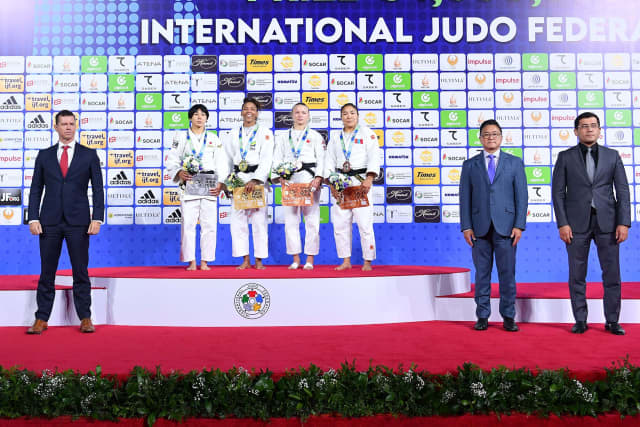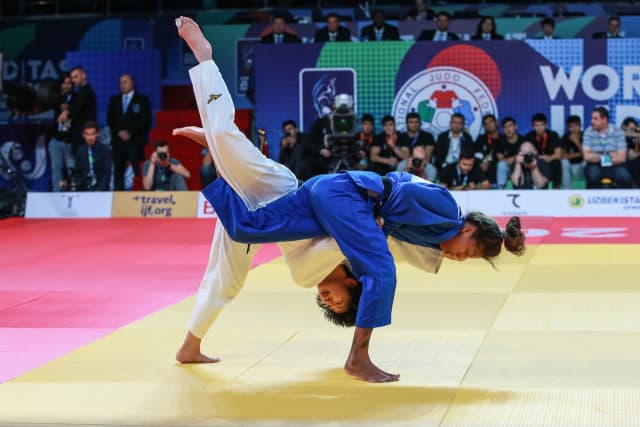The cataclysm began in the third round with the elimination of Crista Deguchi, the Canadian and former world champion, at the hands of the Mongolian Enkhriilen Lkhagvatogoo and the French Sarah Leonie Cysique against the Ukrainian Daria Bilodid. Deguchi is no longer the same one who amazed the world three years ago.
She dominated with class and without mercy in a category that evolved based on her absences. For more than a year, her judo has been more predictable, less incisive. She is no longer a dominating athlete and she loses against opponents whom she would have beaten before without too many problems. Hers is a slow but sure decline, unless she gets motivated again to return to her rightful place according to her talent.
As for Cysique, the problem she had in Tashkent was mostly physical. The Frenchwoman hurt her foot in her first fight against the German Pauline Starke. In the second, Bilodid, who is taller, was in front of her and Cysique was unable to impose her physical power, but unlike Deguchi, her progression has not been questioned.
The disaster of our predictions was complete when the other Canadian and defending champion, Jessica Klimkait, fell to the Korean Mimi Huh. Klimkait has managed to dwarf Deguchi but hasn't done much since last year's world title and Olympic bronze medal. This was an excellent opportunity to reclaim her number one status but she left Tashkent without showing much of what she is capable of.
We had expected a Canadian in the final, maybe both and Cysique between them, or ahead, or just behind. Georgia’s Eteri Liparteliani also fell and it was only 2pm. Until the semi-finals, the only two favourites who made it were the Israeli Timna Nelson Levy and the Japanese Haruka Funakubo.
Nelson Levy had a hesitant start, which earned her a loud scolding from her coach and it worked because in her next fights she was no longer the same, she was more aggressive, more forceful. She had to behave like that until the end, without letting her guard down because the next step was the Brazilian and former Olympic champion Rafaela Silva and she was fit as well and more experienced. The Israeli dropped her guard and landed after Silva’s massive uchi-mata twenty-two seconds after the start. That's what forgetfulness does, it's lethal and that's the difference between the toughest and most complex tournament in the world and everything else.
For her part, Funakubo had a smooth day, as if it were something routine. The Japanese got rid of the Hungarian Karakas and the Brazilian Lima before eliminating Liparteliani, who had no chance of winning. The last obstacle before the fight for gold was Huh, who was also especially inspired. It was the typical combat between Asian judoka, specifically between Japanese and Koreans, very tactical, mutual neutralisation, unspectacular for those who are not experts and with a winner, Funakubo, by hansoku-make.
Silva was the embodiment of what we explained at the beginning, she was the best when she had to be and the only one capable of defeating a Japanese woman in a final because until now it had been an impossible mission. A waza-ari a few seconds from the end was the icing on the cake for a judoka who did not start as the favourite but who prepared herself better than the rest.
It was Klimkait against Nelson Levy for bronze, the first two in the world ranking, who had faced each other four times before, resulting in victories for the Canadian. Of course, after what we have seen in the morning session, Nelson Levy was in better shape but that was before. Nelson Levy kept the same pace but the difference was that Klimkait improved. Mistakes did the rest because Nelson Levy racked up two penalties quickly. The Canadian caught the scent of the injured prey and went for the jugular, marking waza-ari and putting Levy against the ropes. She was so cornered that she ended up giving up her weapons in a very well executed ippon by Klimkait. What the canadian did is a good example of overcoming and perseverance because she showed that you can have a bad day and, despite everything, get a medal. It's never too late to improve.
The second bronze was a neighbourhood match between Lkhagvatogoo and Huh. The Mongolian had expended a lot of energy in her fights, with long and exhausting golden scores. The Korean had spent less time on the mat and took advantage of that factor to take charge of the fight. We are not going to lie, it is not the style of the house, so we confess that the fight was uninspiring for us and the two minutes of golden score did not fix the mess. Lkhagvatogoo won by hansoku-make because she insisted a little more. The Korean didn't want to fight and that's why she lost.












